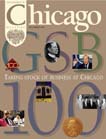The University of Chicago Magazine
December 1997

![]()
This October, Gioachino Rossini's La Cenerentola, an operatic retelling of Charles Perrault's fairy tale "Cendrillon," or "Cinderella," had its Metropolitan Opera premiere in New York City-
some 170 years after its first performance in Rome. At the Met, the final scene found the heroine, mezzo-soprano Cecilia Bartoli, and her prince ensconced as bride and bridegroom atop an outsized wedding cake, the elaborate ornamentation mimicking the composer's own elaborate roulades.
Acting as stylistic adviser for the Met's production and preparing suggestions for vocal ornamentation for Bartoli and the rest of the cast was Philip Gossett, the Robert W. Reneker distinguished service professor and dean of the Humanities Division at the U of C. Gossett has worked with opera houses worldwide, including the Teatro alla Scala of Milan and London's Covent Garden.
Although La Cenerentola was among Rossini's most popular works, it fell out of repertory in the second half of the 19th century, gaining a new public in the early 1970s, when Italian conductor Alberto Zedda's edition was performed at La Scala in Milan. The performance was the first time in this century that the opera had been performed using Rossini's original orchestration and based on his autograph manuscript.
Gossett went one step better, reviewing Zedda's edition and revising it based on the criteria of the Rossini critical edition, of which Gossett is general editor. The revised score will be published in 1998 by the Fondazione Rossini of Pesaro, Italy-the first time that a full orchestral score of La Cenerentola has been printed. It includes a full set of vocal variations for the final aria, found in a Rossini manuscript in the University's Regenstein Library.
Gossett, who is finishing a book on the performance of Italian opera, has been instrumental in the discovery of many compositions, including a lost Rossini opera, Il viaggio a Reims. Earlier this year, his research in Italian opera earned him the highest honor given to a civilian by the President of the Republic of Italy, the Diploma di Grande Ufficiale dell'Ordine al Merito.
While Rossini tells "Cinderella" minus the magical trappings of a fairy godmother and a pumpkin-turned-coach, for Philip Gossett, the essential enchantment remains. The story, he told the University Chronicle, "continues to be about transformation. In the end, Cinderella's transformation, though unassisted by supernatural agents, is brought about by what is perhaps the greatest magic of all: the magical art of music."
Also in Investigations:
The Roots of Reform - Rings around Physics - Citations
